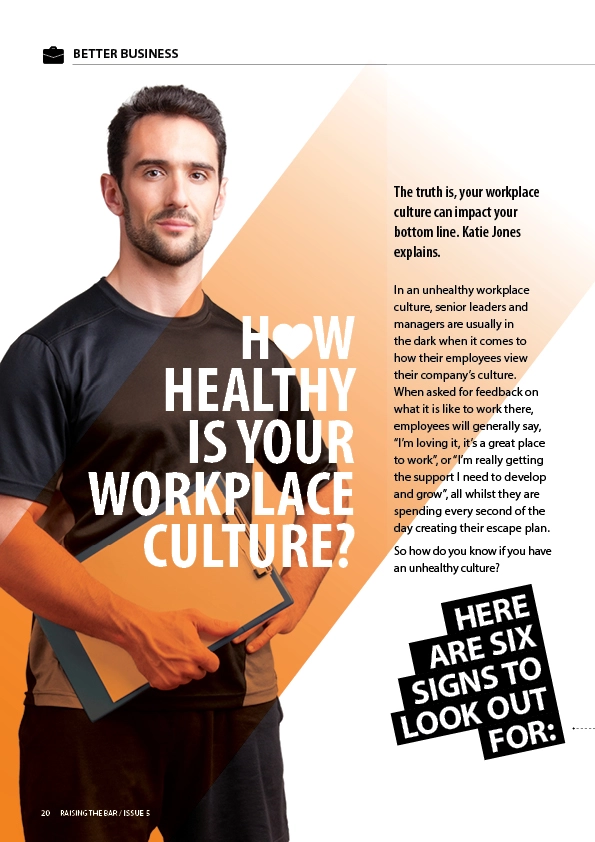BETTER BUSINESS
How Healthy Is Your Workplace Culture?

In an unhealthy workplace culture, senior leaders and managers are usually in the dark when it comes to how their employees view their company’s culture. When asked for feedback on what it is like to work there, employees will generally say, “I’m loving it, it’s a great place to work”, or “I’m really getting the support I need to develop and grow”, all whilst they are spending every second of the day creating their escape plan.
So how do you know if you have an unhealthy culture?
HERE ARE SIX SIGNS TO LOOK OUT FOR:
Poor communication
Clarity and communication are critical for any company. If leaders don’t regularly cascade information down to employees about the direction of the company and business performance, it could result in employees becoming disengaged. It may also result in an increase in office politics, and it could cause employees to feel a lack of job security, which increases paranoia.
Lack of overall leadership
While some of us, unfortunately, have endured a bad manager throughout our careers, having a bad manager is not nearly as damaging to an organisation as a lack of overall leadership. If you work for a business that has a high management or staff turnover, this can be a signal of an unstable future with conflicting messaging.
Unhealthy competition
When it comes to achieving objectives or increasing productivity, competition can be amazing! Unfortunately, if this turns into an unfriendly competition it can begin to drive wedges between employees. By all means, implementing incentive schemes such as “Value Champion of the Month” or “Top Sales Person of the Quarter” can ensure your employees do their best work; however, if the competition gets too competitive, things can turn south, fast.
Fear of judgement
In an unhealthy culture, employees tend not to speak up for fear of being judged; even when they are presented with impossible goals, outrageous plans or silly ideas they are expected to implement. They say nothing to those who need to hear it or can change things, and instead they moan to their peers about the unreasonable expectations.
High turnover
If your employees aren’t even hitting the six-month mark before they’re executing their exit plan then this is the biggest sign of an unhealthy culture. If you notice this is a regular occurrence, then implement an exit interview process so you can ask these people why they are moving on after having been in the role for such a short time.
Gossiping
with all sorts of gossip. Gossip comes from individuals who have the largest, yet most fragile, egos and who feel the greatest threat to their job security, self-esteem, popularity or status. Gossiping, in general, is something that nobody should be doing. Even if it is not malicious, it will diminish an organisation’s culture over time.
If you identify any of the above signs then chances are high that your company culture could do with some TLC. It doesn’t mean that you give up; it simply means there’s room for improvement – and improvement equates to greater productivity and, ultimately, profits.
If you can identify any of these elements in your own business, then now is a great time to make positive changes towards creating a work culture that will serve you and your team better. If you are in a position to influence change, click here to take a Culture Fitness test now, and receive a FREE 90-Day Action Plan to help start improving your culture. ®


Katie Jones
For the past ten years, Katie has worked as a consultant, coach, facilitator, and L&D/HR business partner in many industries, including fitness, hospitality, telecommunications and defence. Her growing passion is partnering with sporting teams and fitness organisations. Katie has also worked with global companies, both in the UK and Australia to grow her expertise in developing teams and senior leaders. Katie recognises that investment in people is the key to a successful business, and she specialises in strategically driving companies towards a high-performance culture. Katie favours experiential learning which enables her clients to leave her training feeling confident and successful. To learn more visit www.culturefithr.com.au